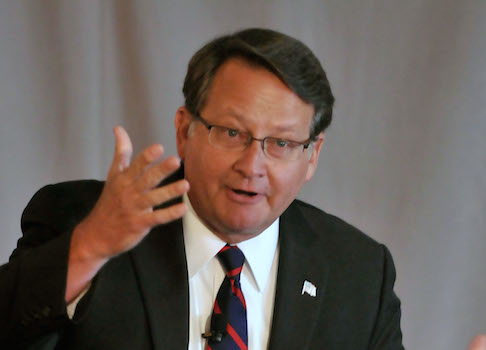Michigan Democratic Rep. Gary Peters is embracing proposed Environmental Protection Agency regulations that could potentially drive up energy costs and cut up to 225,000 jobs every year.
"The setting of achievable and affordable carbon reduction goals is an essential and important first step in the process," Peters said in a statement on his congressional website. "As this process moves forward, I am committed to finding practical, affordable, common-sense ways to reduce carbon emissions, promote renewable energy, and strengthen Michigan’s economy."
Peters, a three-term congressman who has garnered endorsements from a number of prominent environmental groups, pledged to work with the state’s congressional delegation to influence the rulemaking process at the federal level. He noted that the EPA’s proposal, which would require power plants to reduce carbon dioxide emissions by 30 percent by 2030, should allow for more flexibility to "ensure timelines [that] are realistic."
"I am concerned that the proposed draft EPA rule imposes a more stringent standard on Michigan than surrounding Midwestern states. The rule needs to include a mid-term review process to ensure timelines are realistic and recognize that progress may not be linear," he said.
A bipartisan group of business and union leaders and lawmakers have slammed the EPA’s drastic standards. A Chamber of Commerce analysis estimates that the proposals will cut gross domestic product by $51 billion and slash about 224,000 jobs each year they are in place.
"The U.S. power sector is undergoing a period of tremendous uncertainty, driven in large part by an unprecedented avalanche of new and anticipated regulations coming from the Environmental Protection Agency," the report says.
The regulations could hit Michigan’s economy particularly hard by driving up energy costs. Coal generates more than half of the state’s electricity. Most of the coal-fired plants are located in Montana and Wyoming, where the regulations have met staunch opposition.
The coal industry supports more than 8,000 jobs in Michigan and provides nearly $500 million in wages every year, according to the National Mining Association.
"The proposed regulation will adversely impact Wyoming’s economy as the leading coal supplier in the United States. It lacks sound reasoning, technological justification and will not provide regulatory certainty," Wyoming Gov. Matthew Mead (R.) said in a letter to the EPA. "It will cut jobs, increase power costs and stifle innovation."
Republican nominee Terri Lynn Land said in a statement to the Washington Free Beacon that "climate change is absolutely a reality," but she questioned Peters’ commitment to Michiganders who depend on traditional fuels for jobs and cheap energy. She blasted Peters for his bowing to environmental radicals, rather than the interests of his constituents.
"My number one concern is Michigan jobs. There is no doubt President Obama’s EPA regulations raise energy prices and cost jobs," she said in a statement. "We must continue our work to protect the environment but this is not the right plan to implement in the middle of our Michigan comeback."
Peters misrepresented Land’s views in a campaign Facebook post, claiming that the GOP nominee "refuses to acknowledge that climate change exists."
"It’s unacceptable that my opponent is more worried about ensuring the two out of state billionaires who are bankrolling her campaign get new tax breaks than about Michigan’s economy, our Great Lakes, and our agricultural producers," Peters said in the post touting his environmentalist credentials.
Peters has received substantial support from an out-of-state billionaire of his own. He attended a February fundraiser at the San Francisco mansion of hedge fund billionaire Tom Steyer, who has pledged to spend $100 million in 2014 electing environmentalist Democrats. He and Senate Majority Leader Harry Reid (D., Nev.) raised more than $400,000 at the fundraiser for Reid’s super PAC, which has spent $600,000 on anti-Land attack ads.
The Land campaign said it has spoken out against the regulations because it is focused on creating jobs, rather than cozying up to wealthy environmentalist donors.
"Michigan is on the road to recovery and cannot afford the job-killing policies from Washington, D.C., that Congressman Peters has consistently supported," Land said.
